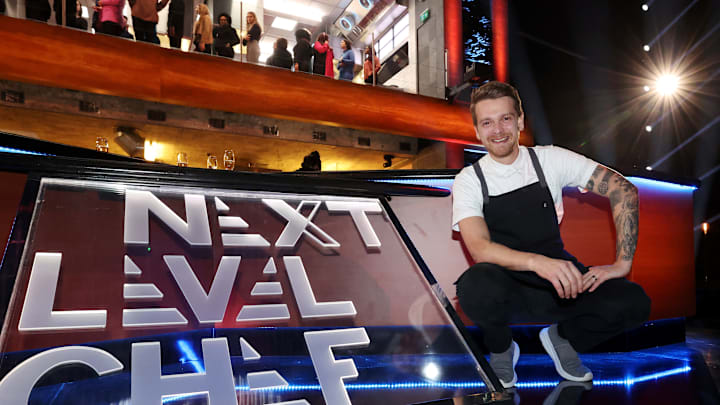Earning the title Next Level Chef Season 4 winner, Austin Beckett brought together all this culinary knowledge, skill, and determination to earn his mentor, Richard Blais, a win. With a technical, thoughtful final three-course meal that represented his culinary journey, Austin proved he was worthy of the title.
Many fans of the popular FOX food television show picked Austin as an early front runner. Even though he had top dishes early, Richard Blais put him into sudden death cook-offs to prove a point. In some ways, that nod of confidence seemed to work to Team Blais’ advantage. More time in the Next Level Chef kitchen can be helpful as the competition continues.
Ahead of the announcement of his Season 4 win, Austin and I spoke about his epic season, why he wanted to compete on Next Level Chef, how he managed the platform, and what is next for his culinary career. While fans of the show saw his range, his impressive background is more than culinary school. Having worked for Michelin Star chefs, he understood how to execute difficult techniques with the vast and varied ingredients that the platform offered.
When asked about what drew him to compete on Next Level Chef, Austin said that his wife pushed him to compete. As the only food television competition that he watched from start to finish, it was time for him to stop talking back to the television and pick up his own knives to cook.
Specifically, Austin said, “nothing displays chefs’ level of improvision under pressure with time management skills than Next Level Chef. I feel like this show forces you to bring out everything simultaneously. It requires every tool kit in your arsenal.”

One of the unique aspects to this FOX food television show is the platform. As other winners have commented, that component can make or break their success. How they adapt to each ingredient curveball is key.
Speaking about the platform, Austin said, “you never really get used to it. It took multiple grabs for me to finally figure out my method so to speak. We are always mindful to let the protein shine, to let that be your compass for developing the rest of the dish. I tried different approaches, including ignoring every piece of advice that I got from the start.”
“I figured out really quickly that a concept kills creativity quicker than anything else. You have to be willing to adapt. Whatever protein you get you need to build the dish around it. Sometimes you do not figure out a dish till you look down at your apron food basket after the grab.”
That ability to think on his feet and devise a dish that fit the challenge was key to his win. Even in the finale, he had to pivot when the proteins did not yield what could have been an easier story to tell his culinary journey.
Explaining his thought process on the finale, Austin said that “I made my concept broader so that I did not get stuck into a specific cuisine. It was my journey through my culinary experience. I’m a melting pot of cuisine through my career and I feel that aspect helped me a lot. I did not give myself blinders by focusing on one cuisine.”
As his final three-course meal showed, it was a range of Asian, Spanish, and French. While the styles were different, each dish was rooted in strong technique and keen execution. Those skills propelled him to win the title.
Although Austin described himself as the “mut of the culinary world,” that diversity is key to what successful chefs incorporate onto every plate. It is more than just staying in a single lane. Looking at the mentors, Gordon Ramsay, Richard Blais, and Nyesha Arrington, all three chefs have diverse restaurants in their portfolio.
Austin believes that his ramen dish captured that diversity. He explained, “that ramen was the farthest thing from a traditional Japanese ramen. I combined Korean gochujang with Chinese fried tofu. It was inspired by a Thai style noodle dish. I brought together all these cultures into one bowl.”
In a way, that concept of blending cultures can be seen throughout Austin’s approach. When asked what type of food he would like to be known for, he said, “I want to create the restaurant ‘without borders.’ I would describe it as a way to link all these different cuisines together to give people a better understanding where each person comes from. Through that experience, people can understand that food might be different, but it is more similar than you think.”
What is next for Austin Beckett? He wants to follow in the footsteps of his mentor, Richard Blais. He said, “Chef Blais came from Michelin Star background, went through Top Chef, and created a restaurant empire. He has restaurants across the U.S. and they have various cuisines. I would love to have that type of success but maybe have better hair.”
Whether or not Austin will win the hair battle, he did earn Team Blais the first Next Level Chef win. More importantly, he proved himself on a huge culinary stage. The future is bright for this talented chef.
Want to catch up on Austin Beckett’s journey to Next Level Chef Season 4 winner? All episodes can be streamed on Hulu. Next Level Chef Season 5 and 6 will be coming to FOX.
